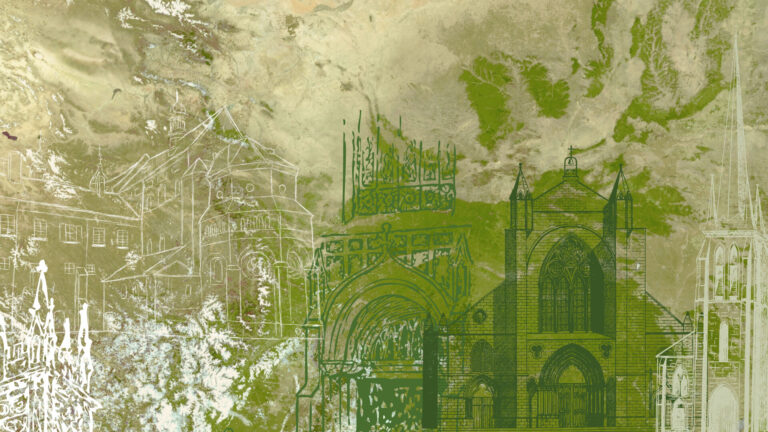Americans are more likely to be unhappy if their kids marry someone from a different political party than if they marry someone outside their religion. Take a moment to let that survey result from the Public Religion Research Institute sink in. Mom and Dad are less concerned about their son or daughter marrying outside of the faith than they are marrying outside of the party.
What does this mean?
Surely this statistic points to the political polarization sweeping the nation, as we huddle together in enclaves of likemindedness when it comes to politics and policy.
But there’s a more troubling element under the surface. When a sizable segment of the population says that political affiliation matters more than religious identity, we’re witnessing something greater than mere polarization; we’re watching the transmutation of politics into religion. For many Americans, it’s not that politics supersedes religion, but that politics is their religion.
This doesn’t mean, of course, that traditional religious practices and doctrines have been abandoned. Many of these Americans happily attend church or go to the temple or adopt disciplines meant to better their lives. But at the fundamental level of orienting and ordering their lives, for many people political convictions have replaced religious belief. Politics has a stronger and wider effect than religion does.
Politics and the Church
It’s not surprising, then, when we see an uptick in disunity in churches across the country, particularly in congregations that feature a variety of political viewpoints. When partisan identity becomes all-encompassing, it’s understandable why some in our churches get along better with people who may not believe in or worship the same God, or whose religious practices and beliefs differ substantially, than they do with their fellow saints who vote differently yet recite the same confession of faith and share the meal Jesus gave us.
It’s also not surprising when many of the loudest and most energy-consuming debates in various denominations are related to political choices and public policies rather than the main message and mission that should be at the forefront of conversation. The Great Commission gets sidelined, whether in mainline denominations that become errand runners on the political left or in conservative denominations that become culture warriors useful to the political right.
The Cult of Politics
Perhaps you’ve encountered people—maybe lifelong friends or even family members—who have become so utterly consumed with the latest political developments that normal conversations about life and the Lord are impossible. Perhaps they’ve fallen for wild conspiracy theories, or they’ve developed a cult-like devotion to a political hero, or they no longer seem capable of finding joy in the world or the church due to excessive interest in spotting racism or injustice in virtually every human interaction. Be it the cult of MAGA or the cult of intersectionality, the result is the same: their political orientation so defines their identity that they cannot imagine the world any other way.
Often this process takes place quietly, over years if not decades of devotion to the most popular talk shows, podcasts, or cable news networks that inculcate and establish politics as the dominant framework for their lives. The story these folks sees themselves in—a political narrative where the politicians and pundits duke it out over the future of the country—unfolds as a mesmerizing drama, chronicled daily through social media and cable news. With politics as the ultimate sphere of significance, some Christians begin to identify themselves primarily, not as citizens of God’s Kingdom, but as foot soldiers in a war in which people on one side want to destroy the nation, while people on the other side fight valiantly to protect it. Even worse, some Christians conflate the two—thinking their political involvement is synonymous with the work of God’s kingdom.
Dethrone Politics
What’s the solution to such a dilemma? It starts with a diagnosis: politics has become an idol. The need of the hour, then, is to counter the disease with ruthless intensity: dethrone politics, by any means possible. We are not to play footsie with idolatry. Anything that captures our minds and hearts and rises to a level of primacy that competes with the kingdom of Christ must be destroyed.
I have reasons for hope on this front. I hear stories of church members who eventually unsubscribed from certain podcasts and stopped frequenting certain websites. Not because the podcasts or websites were off base in everything, but because the Christians recognized their online habits were shriveling their souls. “It wasn’t good for me,” a guy told me recently. “I was angry all the time. I had to get off it,” as if the habit was akin to a drug addition. And in some ways, the addictive element is part of the plan. Many outlets are anger-feeders, monetized by people who reap financial rewards by stoking outrage.
If we do not dethrone politics, we will make the mistake of once again politicizing the faith. And in a world where everything is seen as political, we could easily respond to the politicization of the faith on one side with the politicization of the faith on another. Countering the errors of the religious right won’t happen by embracing the religious left. (It is always disheartening to me when people who—often rightly—chastise Christians for being in bed with Republicans launch that accusation from the bed they share with Democrats.)
A Greater Allegiance
In a world of political and partisan idolatry, the church is to dethrone politics. This does not mean we should embrace political passivity or that we should no longer engage in the political process. It simply means that our fundamental allegiance must be to another King, whose principles and promises transcend the debate of the current moment so that we are able to invest in cultural work over the long haul and not fall prey to the tyranny of whatever seems urgent in one particular moment. Maintaining some distance, disciplining ourselves to not weigh in on every controversy, taking time to ponder and think about wider cultural movements—these are indispensable attributes in showing the world that, as the church, we have a transcendent reference point.
Our allegiance must be higher than any party, ideology, or nationality. Yes, we engage in politics (out of love for neighbor, not fear of the opposition), but our faith cannot and must never become equated completely with any party or partisan ideology. Convictions before caucuses, principles before party, truth before tribe.
If you would like my future articles sent to your email, please enter your address.

















